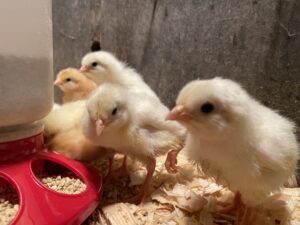How Do I Care for Baby Chicks?
go.ncsu.edu/readext?580823
en Español / em Português
El inglés es el idioma de control de esta página. En la medida en que haya algún conflicto entre la traducción al inglés y la traducción, el inglés prevalece.
Al hacer clic en el enlace de traducción se activa un servicio de traducción gratuito para convertir la página al español. Al igual que con cualquier traducción por Internet, la conversión no es sensible al contexto y puede que no traduzca el texto en su significado original. NC State Extension no garantiza la exactitud del texto traducido. Por favor, tenga en cuenta que algunas aplicaciones y/o servicios pueden no funcionar como se espera cuando se traducen.
Português
Inglês é o idioma de controle desta página. Na medida que haja algum conflito entre o texto original em Inglês e a tradução, o Inglês prevalece.
Ao clicar no link de tradução, um serviço gratuito de tradução será ativado para converter a página para o Português. Como em qualquer tradução pela internet, a conversão não é sensivel ao contexto e pode não ocorrer a tradução para o significado orginal. O serviço de Extensão da Carolina do Norte (NC State Extension) não garante a exatidão do texto traduzido. Por favor, observe que algumas funções ou serviços podem não funcionar como esperado após a tradução.
English
English is the controlling language of this page. To the extent there is any conflict between the English text and the translation, English controls.
Clicking on the translation link activates a free translation service to convert the page to Spanish. As with any Internet translation, the conversion is not context-sensitive and may not translate the text to its original meaning. NC State Extension does not guarantee the accuracy of the translated text. Please note that some applications and/or services may not function as expected when translated.
Collapse ▲ Soon you will hear the familiar chirping of fresh baby chicks in many local stores. These sweet baby chicks seem like the perfect gift for youngsters, but could quickly end in tears if they do not receive the proper care. Just like all babies, chicks need a variety of care items and consistent attention in order to thrive. Some supplies you may need to house a small number of chicks include a brooding box, a heat-lamp, appropriate dry bedding material, a thermometer, and feeder and waterer for chick’s small beaks, along with plenty of clean water and feed.
Soon you will hear the familiar chirping of fresh baby chicks in many local stores. These sweet baby chicks seem like the perfect gift for youngsters, but could quickly end in tears if they do not receive the proper care. Just like all babies, chicks need a variety of care items and consistent attention in order to thrive. Some supplies you may need to house a small number of chicks include a brooding box, a heat-lamp, appropriate dry bedding material, a thermometer, and feeder and waterer for chick’s small beaks, along with plenty of clean water and feed.
Chicks require a balanced diet to thrive. When you bring your chicks home a “starter” diet is required, and chicks should have feed available at all times. Baby chicks should NOT be fed scratch, table scraps, greens or other feed formulations that are intended for adults. These foods reduce the nutrient intake of the chicks and will result in poor growth or death. Water is another critical element. It must be clean and room temperature. Be careful not to place your waterer too close to your heat source as chicks will refuse to drink warm water.
Heat is another requirement of new chicks. Baby chicks are unable to regulate their body temperatures and require supplemental heat even when kept indoors. Chicks should be started at 95 degrees, reducing the temperature 5 degrees each week until birds are feathered or ambient temperature is reached. A good rule of thumb is if they are huddled together they are too cold, and if they are moving away from the heat source they are too hot.
Shelter and bedding are the final pieces to the chick care puzzle. Chicks are extremely vulnerable to predators, so if you are keeping them in an outdoor space special care should be taken to ensure they are protected. They should also be allowed plenty of space so that they can eat, move in and away from heat, and so that bedding is not saturated between cleanings. Space requirements are 1/2 sq. foot per bird from 0-4 weeks of age, and 1 sq. foot per bird from 4-8 weeks of age. Bedding selection is also important. You want to select something that is absorbent and insulates the chicks from the ground but is not slick. Slick surfaces (newspaper, cardboard, glass, etc.) are dangerous for your chicks often resulting in splayfeet and other diseases that will ultimately result in death. Bedding should be changed often to ensure a sanitary space for your new animals. Sanitation is the best defense against disease.
Are you interested in animals, but aren’t sure about the large animal livestock show? The 4-H Poultry Chain may be for you. Small animal shows allow youth participants to get a feel for livestock shows without space and financial investment required for the large animal show.
If you would like more information on caring for chicks, the 4-H poultry chain, or any other livestock issue, contact Desmond Miller, 4-H Agent at 789-4370 or desmond@ncat.edu.
Additional resources on chick care and other small flock resources may be found on the Small Flock Management Resources website.




